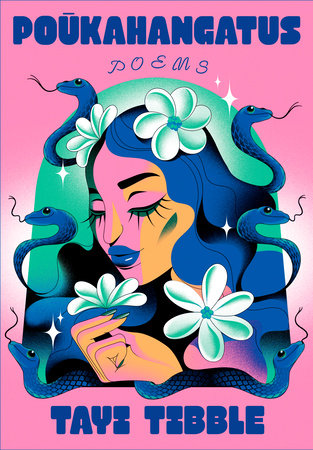by Nicole Yurcaba

Tayi Tibble’s Poukahangatus arrives at a pivotal time in literature when more and more publishers, rightly so, are making a point to uplift and celebrate New Zealand’s Indigenous voices. Tibble is frequently described as “one of the most exciting new voices in poetry today,” and Poukahangatus is a great example of why. Similar to Dorothy Chan’s Return of the Chinese Femme, Poukahangatus is fueled by pop culture references, feminist assertions, Indigenous reclamation, and proof that modern slang can be rendered into poetry.
“Agenda” is a sleek poem, bursting with commands like “Rise from the dead” and “Coordinate hand games/ to the books of the Bible.” Its incorporation of Christianity-related images such as “Lot’s wife turning into salt” establish the influence of Christianity on the speaker. However, that influence is quickly rebelled against as the speaker says one should “Thank Jehovah for the salt / bread, rice, beans and chicken” only to assert that “the dog should receive them instead.” It’s a rebellious tone that only Tibble can display, and it establishes the tonal foundation for so many of the poems that follow it throughout the collection.
“Pania” is a multi-sectioned poem which elevates the prose form. It depicts the story of a woman who when “she worked in Auckland her name was Cheetah” but “in Sydney she called herself Pania.” From the scant details, one can assume that Pania is a sex worker, and the initial section deals with Pania’s experience with a “man quieter than usual.” The man’s recollection of a beloved goldfish, and his loss of it, follows. Quite honestly, this section is not linguistically or artistically conspicuous. The second section is what redeems the poem. It carries striking lines like, “Sometimes her body was a swimming / pool full of dead bees and foliage, and sometimes she liked that / better.” The speaker’s focus on marine life returns to the themes of water and nature established in the first stanza. However, in the second stanza, a larger conversation about colonialism emerges: “She / used to think about sharks and stingrays, then tidal waves, then she / thought about a horizon full of big white sails. Still, she always felt / safe in the water, and she welcomed the invasion.” Nature becomes a protector, an impermeable barrier between the portrayed female figure and the outside colonial forces threatening not only her existence, but also the nature she cherishes. The third section develops a mystical, mythical tone as the speaker depicts Pania telling her enraged lover that he cannot introduce Pania to people because she is “a creature of the ocean and if she didn’t return / when it called her, she would die.” Then, the speaker deviates into a depiction of domestic violence, abuse, and revenge pornography that’s detailed enough to make any reader raise an eyebrow.
Colonialism’s consequences are a key theme in Poukahangatus, and poems like “Assimilation” bring those consequences to the forefront. Gender-based domestic roles and expectations depicted at the poem’s beginning trick readers into thinking the poem is challenging conventional tropes about domestic couples. The speaker vaguely refers to the couple as “they,” and the couple consider “themselves to be / a modern couple” who “take turns // giving / and receiving / oral” as well as splitting the bills. Their schism develops when “he brings in / the washing” and “leaves the pegs / all over the ground.” For the female partner, this domestic litter conjures images of “potatoes and muskets / disease-ridden blankets / surveyors and preachers.” The speaker boldly directs readers’ attentions to the female cost imposed by colonialism: “and how many Māori girls / ended up on their knees / in order to erect / this modern nation.” Intrepid, feminist fortitude dominates the poem’s conclusion as the speaker states that the woman could either “lick them [the pegs] clean” or “plunge them back into the earth’s / dark wet cunt. Let her husband pick them up.” The woman’s rebuke of having to correct the husband’s mistake transforms from a simple act into a defiant, anti-colonialist act of reclamation, and it is also an assertion of Indigenous and female fortitude.
Similar themes are paramount in the poem “Identity Politics.” The poem references “The 6th of February,” also known as Waitangi Day in New Zealand, which is identified as the country’s national day. The speaker describes the day as “the greatest failed marriage this nation has ever seen.” The speaker also alludes to the influence of American culture and society: “In America, couples have divorce parties” and alludes to a collective “We” which arrives “fashionably late.” Again, the speaker returns to the significance of nature and the sea to New Zealand’s Indigenous people by stating, “The sea / our ancestors traversed stretches out farther than the stars.” These images reinforce the speaker’s personal connection to ancestral legacy and ancestral resilience.
Poukahangatus is a huge face-slap to a nation’s colonial history and the recent emergence of a far-right movement that threatens some of New Zealand’s most vulnerable groups. Sassy, smart, and sexy, provocative and colorful, Tibble’s poetry collection might just be the best poetry collection 2024 offers.
Nicole Yurcaba (Ukrainian: Нікола Юрцаба–Nikola Yurtsaba) is a Ukrainian (Hutsul/Lemko) American poet and essayist. Her poems and essays have appeared in The Atlanta Review, The Lindenwood Review, Whiskey Island, Raven Chronicles, West Trade Review, Appalachian Heritage, North of Oxford, and many other online and print journals. Nicole teaches poetry workshops for Southern New Hampshire University and is a guest book reviewer for Sage Cigarettes, Tupelo Quarterly, Colorado Review, and The Southern Review of Books.



Add your first comment to this post